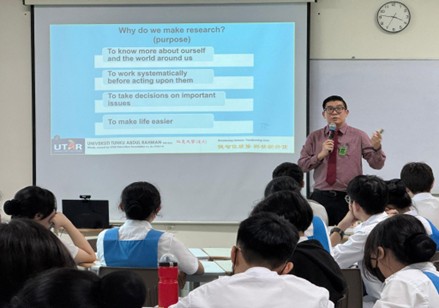Reported by:
Tan Ee Shieng Sr1ScB
Photo by:
Kuen Cheng Photo Album
The Inquiry-based Learning Project (IBL) is a collaboration between Kuen Cheng High School and University of Tunku Abdul Rahman (UTAR) aimed to promote a sustainable future by encouraging students to take part in innovation and investigative projects. A seminar titled “Research Methods: From ‘Why’ to ‘Aha!’”, an IBL Talk Series 2025, was held after school on October 27th. Dr. Foo Chuan Chew from the UTAR Teh Hong Piow Faculty of Business and Finance was invited to share his expertise in research methodology to enhance the students’ understanding of research philosophy.

